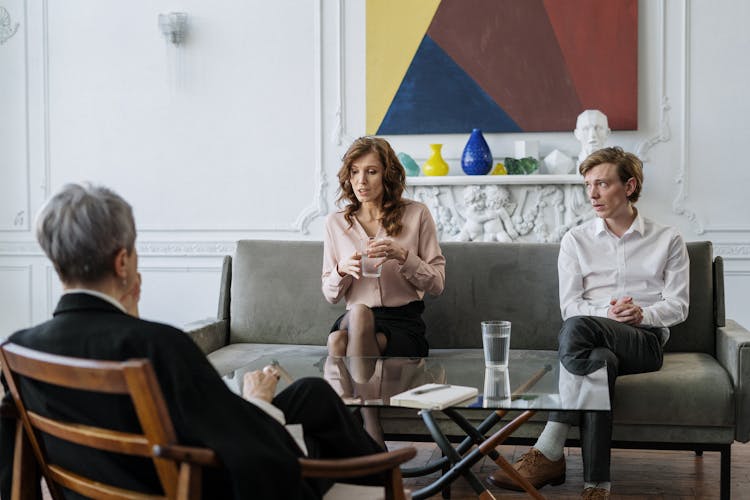Due to intensely enforced insurance, medical bills are reduced in some parts of the world. Because we are used to receiving subsidised healthcare in Ghana, it has become the cultural norm to seek medical attention only when we are seriously ill. The majority of people would instead maintain the status quo. We want to avoid dealing directly with the high healthcare costs.
If you are struggling with a significant mental illness or suicidal ideation, community mental health services cover counselling and therapy. You can use this resource without having to pay anything at all if you’re going through personal difficulties. However, due to the nature of insurance, some individuals may never use this service, and your earnings contribute to this group coverage.

Couples meeting a counsellor. Image:pexels
However, if your employer does not subscribe to this plan, you are self-employed, or you do not work outside the home, paying for counselling may prevent you from scheduling your first appointment. So, why pay for therapy?
If you are struggling with suicide or a major mental illness, community mental health services typically cover counselling and therapy. Some large employers offer a group insurance plan called the Employee Assistance Plan (E.A.P.). This plan helps pay for limited sessions with a psychologist or a registered clinical counsellor. You can use this resource without having to pay anything at all if you’re going through personal difficulties. However, due to the nature of insurance, some individuals may never use this service, and your earnings contribute to this group coverage.
The anxiety that comes from thinking about paying for therapy or counselling is the biggest obstacle. Our being, which works so hard to maintain homeostasis, resists change whenever we decide to make one, usually in the form of fear. Anxiety, discomfort, nervousness, and other feelings of fear can powerfully persuade us to do nothing or to try harder if we do not have paid support. Our poverty consciousness comes to life when underlying beliefs about money come to light and ideas like, I cannot afford to pay for a conversation. There might be something I must give up. What about the members of my family? Suzy stated that she required new shoes, etc.
The family environment we grow up in and the attitudes we observe shape our views on money. Children are exceptionally observant of the financial stress that their parents experience, including worries about whether or not they will be able to meet their monthly expenses. Middle: A family’s socioeconomic status—whether they live near the poverty line, in the middle, or in the upper-middle class—can influence these attitudes.
Children take away and internalize their feelings and thoughts about money, as well as their conclusions and assumptions about it. Children want to know everything that’s going on in their family, and if they feel like they don’t have enough, it can make them think they’re poor. The belief that there is not enough leads to this frame of mind. This mixed-up conviction becomes incorporated as truth and shapes our convictions about cash, impacting our activities and choices repeatedly.
As adults, we can’t ignore the things that challenge our beliefs. We may experience hostility, jealousy, and resentment when we observe others living lavish lives because we cannot comprehend how they achieve such wealth. We will struggle with our emotions and develop coping mechanisms (which may even lead to addictions) that keep us stuck in the same patterns if we are accustomed to criticizing ourselves or if we have a critical mindset that restricts our capabilities. Counseling and therapy are all about confronting false beliefs.
We make our current thoughts and feelings explicit when we place self-care at the top of our priorities and acknowledge that we need to change. Professionals such as counsellors and therapists can assist us in recognizing cognitive flaws and limiting beliefs. We need help to accomplish this. We tell ourselves, “I am valuable and capable of achieving more in life,” by developing a relationship with a counsellor or therapist. Although seeking counselling may give us the impression that something is wrong with us, it demonstrates that some of our beliefs may be incorrect. Something we learned or were taught needs to be helping us in the way we want it to. We demonstrate self-confidence by investing in counselling, believing that the money we put into our well-being will pay off in the long run. One of the best ways to show our commitment to achieving our goals and seeking inspiration is to pay for counselling. There is no limit to what we can accomplish once we accept the belief that “I am worth it,” and a life of abundance and fulfilment becomes possible.

Having a one on one session. Image:pexels
Always seeking medical attention is very important; one does not need to be sick or ill before talking to or booking an appointment with the doctor. The lack of regular medical checkups has led to many mishaps. Medical conditions that would have been managed or cured are now taking people to the grave. Regular medical care draws your attention to impending sickness and ways to mitigate it.
There is a story about a young girl who was very energetic and loved by everyone. She loved to sing, dance, and draw, and her parents were very protective of her. She will win most of the awards in school as a child. She won a scholarship to attend an Ivy school, and then the worst happened. On the day of her admission, she collapsed. It is a sad posture for a girl with such a prospect. Well, a series of tests and scans ran for her, and it now showed everyone that she had cancer. The question was, why now? If she had had regular medical checkups, such breaking news would not have sown our heads. Now, she missed her opportunity to aspire to manifest her mission in her heart. Instead, she had to be flown outside the country for education and medical care.
The above exposition summarizes the need to seek a counsellor whenever you feel the urge. Let us all be aware of this and be mindful.


